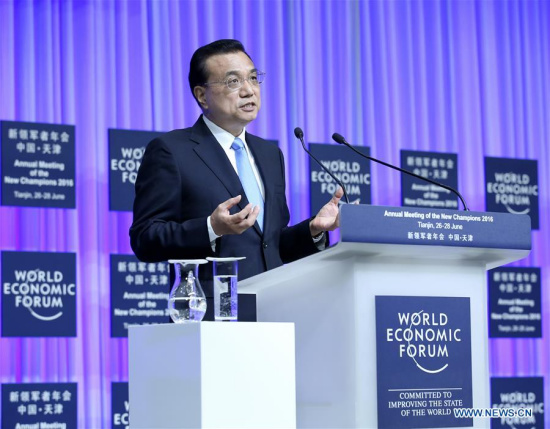
Chinese Premier Li Keqiang addresses the opening ceremony of the Annual Meeting of the New Champions 2016, or Summer Davos Forum, in Tianjin, north China, June 27, 2016. (Xinhua/Pang Xinglei)
Premier Li Keqiang denied the possibility of the Chinese economy suffering a hard landing when he addressed the Annual Meeting of the New Champions 2016, or Summer Davos, in Tianjin Monday.[Special Coverage]
"We can deliver the major economic and social development targets set for 2016," he said at the opening ceremony of the forum for business people and leaders of rapidly emerging economies.
The Chinese economy continued to grow stably in the second quarter of the year, following a 6.7-percent expansion in the first three months, said Li.
New economic drivers are developing quickly and major economic indicators are stabilizing or improving, according to the premier.
In the first five months, 5.77 million urban jobs were created. The unemployment rate in 31 major cities was 5.02 percent in May.
"We are optimistic about the economy now and in the future," said Li.
China's economic fundamentals are unchanged, and the government will keep macro policies constant and stable, said Li.
"Generally speaking, the economic structure is optimizing. The quality of growth is improving. Momentum is gathering," he claimed.
But the premier cited weak external demand, sluggish private and manufacturing investment, financial risks and overcapacity as big problems.
He vowed to keep pushing supply-side structural reform with a focus on reducing capacity, destocking, deleveraging, and reducing the costs of doing business and fixing shortcomings.
China is trying to wean itself off an over-reliance on natural resources and turn to human resources and innovation to keep the economy growing at a medium-high speed.
The country will continue to promote mass entrepreneurship and the "Internet Plus" initiative to foster new growth engines. About 40,000 new market entities are being set up every day, according to Li.
The government will also continue to cut excess capacity in the steel and coal sectors in "a market-oriented and lawful" manner, he vowed.
According to the premier, governments and enterprises will take measures to reemploy steel workers and coal miners made redundant.
"Overcapacity is a global challenge and China stands ready to be a responsible country with all these proactive measures," he said.
The government is reforming its own services to cut red tape and regulate emerging sectors or business models.
Li also promised that China will make fiscal, financial and investment adjustments to support the real economy, deepen reforms in state-owned enterprises and give private firms more access to the market.
In addition, China will further open up the service and manufacturing sectors and create a fairer, more transparent and predicable investment environment for foreign investors.
China will maintain a managed floating foreign exchange mechanism that is market-based and adjusted in reference with a basket of currencies, Li said, adding that economic fundamentals rule out a long-term depreciation of the yuan.
China's GDP growth slowed to 6.9 percent in 2015 following about three decades of rapid expansion. The annual target for 2016 was set between 6.5 percent and 7 percent.
"Growth of 6.5 percent is still very impressive in the current global economic environment," said Dennis Wijsmuller, chief operating officer of Arqaam Capital, an investment bank in the United Arab Emirates.
What impressed him the most was the depth and diversity of the Chinese economy in terms of the contribution of local consumption to GDP growth.
The quality of growth is much higher than in the past as China attaches greater importance to environmental protection, coordination and science and technology, said David Wu, Beijing senior partner of consulting firm PricewaterhouseCoopers.
Wu expected China's GDP to double in 10 to 15 years to about 20 trillion U.S. dollars and this process will create massive opportunities for domestic and foreign companies.
"We are seeing lots of strong growth and potential in several sectors, which shows that there is reason to be positive," said Michael Thorneman, managing partner of consulting firm Bain & Company, Greater China.
These include Internet-focused industries, wealth-driven consumption and green technology, according to him.


















































